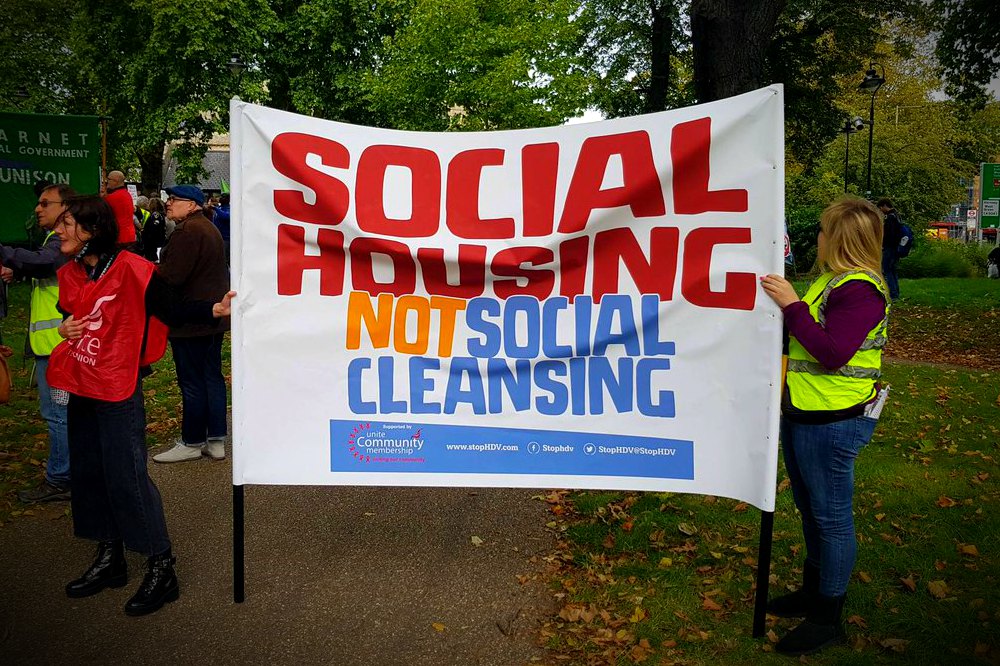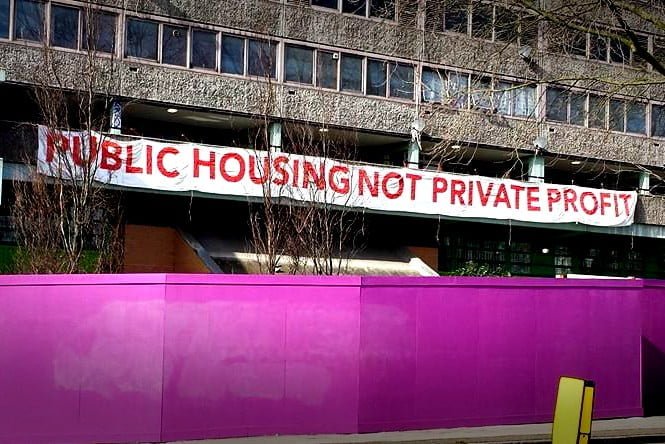We publish here a pair of articles from Labour supporters looking at how a Corbyn Labour government can tackle the housing crisis in Britain. We need bold socialist measures to provide decent homes for all.
A new housing campaign forum has been set up by Leyton and Wanstead CLP in London. The forum’s ambition is to advise the CLP and to campaign locally on housing issues. At its first meeting in November last year, several important ideas about how to solve the housing crisis were debated.
Rent controls
One suggestion was rent controls. Landlords get away with criminally high rents, especially in London. This is why the London Renters’ Union is suggesting capping rents at one third of a person’s income.
But several people correctly pointed out that one third of your income on rent is still very high. The question was asked why anyone should be permitted to make profit at all out of such a basic necessity as housing. Surely such things should be determined by need, not profit? In the 1970s and 80s, a common demand in the labour movement was for rents to be capped at just 5% of income.
It was also pointed out that in 1974 the Wilson-led Labour government introduced a Rent Act that tried to regulate rents. The result was landlords taking their properties off the housing market and leaving them empty, in defiance of the government. This landlords’ strike threatened a major housing crisis, and the Wilson government was forced to back down.
This sparked some discussion about what a Corbyn government would have to do faced with similar sabotage from landlords. One suggestion was the requisitioning of properties left empty by landlords, as Corbyn himself suggested in order to house families affected by the Grenfell fire.
With so many houses left empty for speculative purposes to enrich the 1% – while thousands of people sleep rough every night – landlords should be counting their blessings that all they face is expropriation. Many people would consider such behaviour worthy of far harsher punishment.
It was suggested that councils could compulsorily purchase empty houses, instead of requisitioning them. But it’s not clear why we should have to pay anything at all to parasite landlords. If landlords are withholding housing from people who need it, and demanding payment before they release the properties, they should be charged with extortion, not paid off.
It was asked who would enforce the requisitioning of empty houses? Councils are cutting staff as it is, and such a policy would require significant manpower. One idea to get around this was to impose a 1000% tax on empty properties, which it was suggested would not require so much effort.
But in reality the landlords would do everything to avoid such a tax, including simply refusing to pay it. Enforcement would be just as much a problem with taxing as it would be with requisitioning.
In fact, requisitioning empty houses to solve the housing crisis would capture the imagination of millions of people. Councils could mobilise mass movements on the basis of that demand to carry it through in practice. What would a tiny group of landlords be able to do in the face of that?
In Spain, mass mobilisations have prevented people from being evicted from their homes by the banks. Faced with dozens and even hundreds of people standing in their way, bailiffs have been powerless. This shows what can be done with radical policies.
Council house building
 Another important idea that was brought up at the meeting was the need to build one million new council houses over the course of a Labour government. Such a policy is desperately needed and would be very much welcomed by working class families and young people.
Another important idea that was brought up at the meeting was the need to build one million new council houses over the course of a Labour government. Such a policy is desperately needed and would be very much welcomed by working class families and young people.
One person asked how the construction of one million council houses would be paid for by the government. The answer given was that the government would be able to borrow against the value of the houses and pay off the loans using the rents collected from council tenants.
All other things being equal, this could work. But with a Corbyn-led Labour government in power, all other things won’t be equal. With left-wing Labour in power, big business will begin shifting capital overseas and halting investment in the country.
This in turn will cause a run on the pound, something that shadow chancellor John McDonnell has already warned about. This would push the cost of borrowing to eye-watering levels. Borrowing against the value of council houses would become unaffordable for the government. Or else the council rents required to pay back the loans would become so high that ordinary people wouldn’t be able to afford them. This would defeat the whole point of a mass programme of construction.
Interestingly, someone pointed out that that 1929 Labour manifesto also included a demand for one million council houses. This was never carried out due to the Wall Street Crash and the subsequent global crisis, which created economic chaos. The capitalist class put pressure on the Labour government to abandon its policies. This eventually led to the betrayal of the party in 1931, with Labour right-wingers leaving the party to form a National Government. This Ramsay MacDonald government acted to protect the rich by making ordinary people pay for the crisis.
This example is relevant today. Neither Britain nor the rest of the world has recovered from the 2008 crash. All serious analysts expect another crash imminently. The same pressure that led to the 1929 Labour government abandoning its plans to build one million council houses will be brought to bear against Corbyn.
Only two options will be left on the table for a Corbyn government to consider. Either we take the land, the construction companies, and the banks directly into public ownership in order to finance and build council houses. Or we fail to deliver on the promise to solve the housing crisis. For the millions of people who are putting their faith in a Corbyn government to solve this problem, this really isn’t a choice at all.
Why shouldn’t we expropriate and nationalise the land-owners, the construction companies, and the banks? They have been making profits out of us for decades through extortionate rents, exploitation of our labour, and ruinous interest rates on loans and mortgages.
After all, it’s thanks to bailouts using billions of public money that the banks are still standing. And it’s thanks to tax breaks and low corporation tax that the construction companies are where they are today. We are the ones upon whose backs these businesses have been built, and we have every right to take them over to solve the burning problems in Britain today.
Next steps
The discussion at the housing forum was an excellent starting point for developing a radical housing policy that we can campaign for a Labour government to adopt. There are several meetings and other events coming up – both locally and nationally – at which we’ll be able to make the case for a socialist housing policy based on needs not profits, for the many not the few.
Labour must take bold measures
By Jason Phillips, Epping Forest CLP
 Walking through the old shopping centre in Stratford, East London, I am reminded of a fringe meeting I went along to at the Labour Party conference a few months back.
Walking through the old shopping centre in Stratford, East London, I am reminded of a fringe meeting I went along to at the Labour Party conference a few months back.
The meeting was on the housing crisis and the need to come up with solutions to solve it. But it failed to provide any real answers or alternatives to the broken status quo.
Rough sleeping
At the Stratford Centre in London at night there are a growing number of homeless people taking shelter. According to homeless charity Shelter, 1-in-25 people in the London Borough of Newham, where the Stratford Centre is located, is ‘officially’ homeless. But even these statistics are assumed to be a very low estimate of the actual situation.
According to figures from another charity, Homeless Link, the percentage of those sleeping rough in England is rapidly going up every year. London has the worst levels of rough sleeping in the country.
Government figures show that in the first quarter of 2018, from January to March, there were 13,740 households deemed ‘statutorily homeless’ in England. ‘Statutorily’ means that these families and individuals meet certain criteria, and therefore local authorities have a duty to provide housing for them.
But these figures don’t include the number of people who are on the waiting list for social housing. According to the Independent newspaper, 1.15 million households are currently on waiting lists for social housing in England, with “at least 310,500 people [who] have been waiting to be moved into social homes for more than half a decade [and] with some waiting for as many as 18 years.”
On a personal note, this is about the length of time I have been on the waiting list for social housing. I first applied when I was 18. The only time I ever heard from my local authority on this was when I was asked if I still wanted to be on the waiting list, five years ago. Since then I’ve continued to have no contact with them and remain on the waiting list.
Falling short
It is with these figures in mind – and with my own personal experience – that I decided to attend a Labour fringe meeting at the last Labour Party national conference, entitled Solving The Housing Crisis: How Do We Reach 300,000 New Homes?
The title sounded a little conservative to me: only 300,000 homes – in total, not each year; and not even specifically social housing. Nevertheless, I thought I’d give it a try.
There were several MPs there. No doubt they are passionate about building homes for people. But the conclusions they came with were entirely inadequate given the enormity of the problem.
Siobhain McDonagh (Labour MP for Mitcham and Morden) suggested that the main barrier to building houses was green belt land. This may be a barrier to some construction. But removing green belt restrictions will not be enough to meet the scale of construction required.
Lord Adonis, an arch-Blairite who served in the New Labour government, argued that the biggest problem was Brexit. Therefore, he concluded, it is imperative that we stay in the EU. I put it to him that the housing crisis existed a long time before we voted to leave the European Union. He gave no response on this point.
With these two arguments dominating the entire discussion, I came away from the meeting completely unenthused by what was on offer.
Building for need
 The current shadow housing secretary, John Healey, however, has recently provided more interesting promises about Labour’s housing policy. “Labour would build 100,000 genuinely affordable homes to rent and buy a year,” Healey has announced, “and would undertake the biggest council house building programme in at least 30 years to build homes the country needs.”
The current shadow housing secretary, John Healey, however, has recently provided more interesting promises about Labour’s housing policy. “Labour would build 100,000 genuinely affordable homes to rent and buy a year,” Healey has announced, “and would undertake the biggest council house building programme in at least 30 years to build homes the country needs.”
These are laudable aims to try to tackle the housing crisis, which the working class can get behind. But targets are not enough. We need to explain how we can achieve these goals.
The obvious reason why we have a housing crisis is because, as a society, we generally don’t build council houses anymore. A 2017 newspaper report looking specifically at the number of council houses in existence found that levels are at their lowest since records began.
Inaction by Tory governments has meant that “the number of new social houses being built plummet by 97% since 2010.” A meagre total of just 1,840 homes were built by councils across Britain in 2017.
The reasons we don’t build council houses is because we don’t own the means to do so. Instead, the land, banks, construction companies, and empty properties lie in private hands, who only produce for profit.
At this moment, therefore, it is profit that ultimately determines if houses are built. And the prices and rent are determined not by affordability but by the market.
We need to stop council houses from being sold off and landing in private hands. We need to nationalise privately-owned land. We need to take over the ‘commanding heights’ of the economy, so that we can finally put people’s needs before profit.
This means taking over the major economic monopolies – including the big banks – in order to plan and direct the resources required to build not just 300,000 houses, but the millions that are desperately needed.






